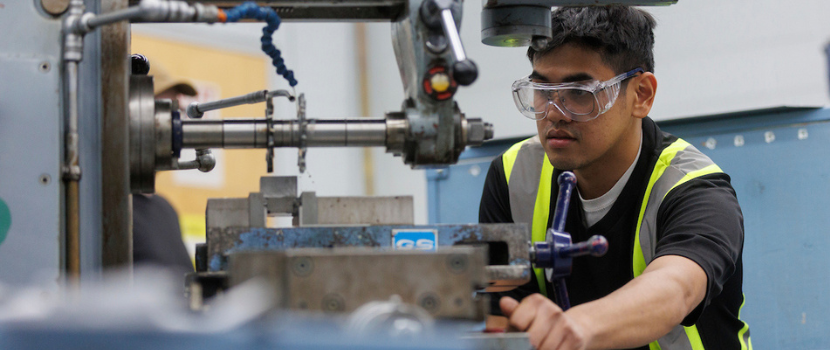
Machinists are in high demand in western Canada—from the oil patch to power utilities, from manufacturing facilities to mines, mills and chemical plants. The job demands both problem-solving and creativity to machine parts to blueprint specifications.
Start date
August
Length
34 weeks
Location(s)
Regina, SaskatoonThe Machinist certificate program can fast-track you into the workforce, and give you a head start on apprenticeship. You’ll need good computer skills, math skills and be comfortable working in industrial settings.
Machinist is a one-year certificate program offered in Saskatoon and Regina. You’ll learn on a variety of machine tools in Saskatchewan Polytechnic’s well-equipped shops including lathes, mills, drill presses, surface grinders, CNC lathes and machining centres. You’ll also learn online, blended training for the CNC course, and participate in an industry-based work experience.
Experienced instructors who understand the demands of industrial workplaces, from maintaining workflow to working safely, will help you build knowledge and skills in:
- blueprint reading, technical drawing, precision measurement
- communications and applied math
- computer numerical control (CNC)
- drilling machine operations
- grinding and sawing operations
- heat treatment processes
- lathe operations
- materials selection
- milling machine operations
Apprenticeship credit
Trade to degree
Career and salary information
Your career
Graduates of the certificate program are working in manufacturing facilities, equipment repair shops, custom machine shops, steel mills, metal fabrication plants, power generating plants, food processing plants, mines, welding repair shops, engine rebuilding shops and machine manufacturing companies.
Potential careers
| Sample job title | NOC classification |
|---|---|
| Computer numeric control (CNC) machinist | Machinists & machining & tooling inspectors (72100) |
| Tool and die maker | Tool & die makers (72101) |
Admissions
Admission requirements
- Grade 12
- English Language Requirement
Alternative admission
Applicants who do not possess the academic qualifications for a program may be admitted if evidence of probable success can be established through an alternative admission assessment. Applicants are automatically considered for alternative admission. However, some specific admission requirements may still need to be met.
ACCUPLACER©
Refer to the ACCUPLACER© cut scores for this program below, and review additional details concerning Alternative Admission using Accuplacer.
- 250 Arithmetic
- 245 Quantitative Reasoning, Algebra, and Statistics
- 243 Reading
Post-secondary
Some programs allow applicants to meet the admission grade level requirement using 15 approved post-secondary credits. Review additional information.
Admission method
First Qualified/First Admitted
The First Qualified/First Admitted (FQFA) process is used for the majority of Saskatchewan Polytechnic programs. When we determine that you meet the program's admission requirements, you will be offered admission based on the date you fully qualify for the program. The earlier you provide the appropriate documents and information that qualify you for admission to the next intake, the earlier you might begin your studies.
Applications for all FQFA programs open September 1 each year.
Sponsored programs or programs targeted to specific groups do not accept applications year round or maintain an application pool.
See Admission Processes for more information about this method of admission.
Tuition and fees
Estimates are based on current rates and are subject to change. Amounts for a program may vary by campus. Totals shown here include all mandatory fees as well as approximate cost for books and supplies. Visit the Tuition and Fees web page for a complete breakdown of tuition and fees for this program.
2025-26 academic year
$9,260
International students
View tuition rates for international students.
Courses
Get credit for what you know
Prior Learning Assessment and Recognition
Saskatchewan Polytechnic recognizes that adults learn in many different ways. This includes acquiring knowledge and skills through life and work experience or non-formal training.
See link(s) below to get more information about PLAR.
Transfer credit
Many Sask Polytech students benefit from transferring course credit. You may be eligible to transfer credit to Sask Polytech or to another college or university.
Student awards
Thanks to the generosity of donors and alumni, Saskatchewan Polytechnic gives away more than $2 million in student awards during the academic year.
Saskatchewan Polytechnic offers student awards for every certificate and diploma program at every campus. Not all student awards are based on marks - some are based on financial need or things like community or volunteer involvement.
Additional information

